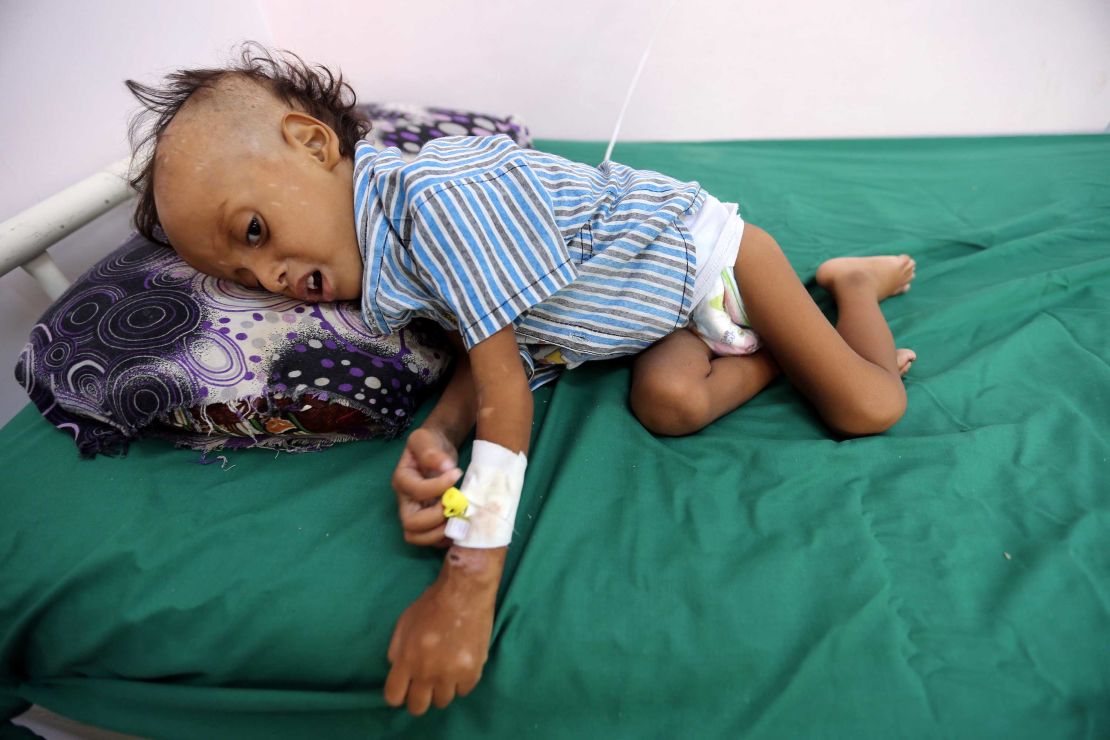The United States will bear shared responsibility for what may be the largest famine in decades if it does not cease its military support for the coalition led by Saudi Arabia and the United Arab Emirates in Yemen, the heads of five major humanitarian organizations have warned.
In an unusually stark joint statement, the leaders of the International Rescue Committee, Oxfam America, CARE US, Save the Children USA and the Norwegian Refugee Council USA together urged the US government to act to save Yemeni lives.
“The stakes in Yemen are shocking and must be stated clearly: 14 million people are at risk of starving to death in Yemen if the parties to the conflict and their supporters do not change course immediately,” their statement says.
Unless the warring parties immediately cease hostilities, reopen all Yemen’s ports to let in commercial shipments, allow humanitarian staff and aid to reach those in need, and stabilize the Yemeni economy, including by paying civil servants, “countless” Yemenis are unlikely to live through the winter, the humanitarian leaders warn.
“If the government of Yemen, Saudi Arabia, the United Arab Emirates, Ansar Allah, and other parties to the conflict fail to take these steps, and if the United States does not use all levers of pressure to compel them to do so, responsibility for the deaths of many more Yemeni civilians will lie not only with the parties to the conflict, but with the United States as well,” the statement says.
Yemen’s war of three-and-a-half years has killed at least 10,000 people and pushed the nation to the brink of the world’s worst famine in 100 years, leaving 14 million people – about half the country’s population – at risk of starvation, according to the United Nations.
Save the Children said Wednesday that an estimated 85,000 children under the age of 5 may have died from extreme hunger or disease since the war began.
The US and others have supported the Saudi and UAE-led coalition in its fight to expel Iranian-backed Houthi rebels from Yemen.
But in recent weeks, moves to find a solution to the conflict have picked up pace, with international pressure mounting against Saudi Arabia, the most powerful player in what started as a civil war but evolved into a proxy conflict.
US Secretary of Defense James Mattis said Wednesday that peace talks would take place in Sweden early in December between the Houthis and Yemen’s UN-recognized government, with the Saudis and Emiratis “fully on board.”
The United Kingdom also filed a draft resolution on Yemen at the UN Security Council that emphasizes an end to hostilities and access for humanitarian aid. The draft calls for a two-week break in fighting to allow aid into the besieged country. A vote is expected soon.
Meanwhile, fighting erupted again in the strategic port city of Hodeidah, aid workers told CNN, after briefly easing off. Violence around the rebel-held port has severely affected the delivery of aid.
Made in America: Shrapnel found in Yemen ties US bombs to civilian deaths
‘No means left to avert a catastrophe’
The five humanitarian organizations acknowledge that the US is one of the most generous humanitarian donors in Yemen. But, they say, “these contributions pale in comparison to the harm caused by US military support and diplomatic cover to Saudi Arabia and the United Arab Emirates.”
While the Trump administration has said that ending the war in Yemen and relieving the humanitarian crisis are top national security priorities, the statement says, “US policies tell a different story. By providing such extensive military and diplomatic support for one side of the conflict, the United States is deepening and prolonging a crisis that has immediate and severe consequences for Yemen, and civilians are paying the price.”
The statement adds that the crisis is “entirely man-made” and that the deaths in Yemen cannot be dismissed as an inevitable consequence of war. “The causes of death will be import restrictions, blockades, non-payment of government salaries, inflation, job losses, displacement, declining incomes, and violent attacks that kill civilians and destroy the infrastructure that delivers food and safe water,” it said.
The humanitarian organizations will stay to deliver help to the people of Yemen as they have since the war began, often at great risk, the five leaders said.
“But now, as violence escalates, and the insidious tactics of war take hold of millions of people, we have no means left to avert a catastrophe in Yemen; every humanitarian effort can no longer prevent mass starvation if the war is not brought to an end immediately and urgent efforts undertaken to ensure food, fuel, and other vital supplies reach those in greatest need,” they said.

US moves
Mattis and US Secretary of State Mike Pompeo called late last month for the warring parties in Yemen to agree to a ceasefire “in the next 30 days.”
The US then announced that it would no longer refuel Saudi aircraft conducting strike missions over Yemen. The US provides refueling for some 20% of Saudi aircraft.
US Senator Bernie Sanders has also said he plans to bring a resolution to end US involvement in the Yemen conflict back to the Senate.
CNN reporting this summer revealed that fragments of US-manufactured weapons had been found at the sites of a string of attacks since the start of the war, including a bomb that killed 40 children on a school bus.






